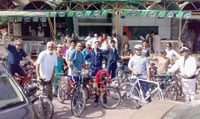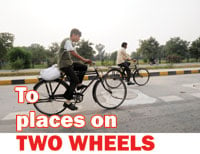Ditto.
Tuesday, November 17, 2009
Friday, October 23, 2009
It's time for October's Critical Mass Event

This Critical Mass cycling event will see us prowling the innards of Lahore where riding a bike offers the chance to sample more of Walled City life without picking a tab.
The thrum of the historic Walled City will lift your spirits as we catch the city-folks going about their morning ritual of Nashta.
Spinning via Anarkali Bazar we will enter the walled city from Lohari Gate and zigzag our way through the maze of Said Mitha, Paniwala Talab, Rang Mahal, Kashmiri Bazar, Chuna Mandi, Sheranwala Gate, and weave our way back from Fort Road, Red Light District, and Bhati Gate returning to Nila Gumbad via Lower Mall.
Critical Mass is about having clean cities that provide mobility and accessibility. Critical Mass is about clean transport. Critical Mass is about putting public good over private interest. Critical Mass is about making friends. Critical Mass is about reclaiming public space. Critical Mass is about showing a man or a woman on a cycle is the same as one in a ten lac car. Critical Mass is about democracy.
Tuesday, October 6, 2009
To places on two wheels
Most of Lahore isn't large or difficult to get around on a cycle. So, why can't we adopt it as our preferred mode of transport? By Ahmad Rafay Alam TNS (http://tiny.cc/Y4VrR)
When the editor of this newspaper commissioned me to write an article on 'how Lahore can be made cycle friendly', I thought that making a list of things that could be done was one way to go about it, but to convince everyone about the need to cycle would be more effective. Once the need for cycle-friendly cities is understood, the 'how' is merely procedural -- a means to an end.
To begin with, we have to understand that our cities, and especially Lahore, are polluted; and that if we don't do something to improve the air quality in our urban areas, we are, for sure, killing ourselves. Urban air quality deteriorates because of an excess of commercial and industrial activity. It also deteriorates because of a scandalously poor sewerage and sanitation system. But the air in our cities is also made poisonous by the emissions of the many hundreds of thousands, if not millions, of private automobiles that congest city roads.
Incidentally, the increase in automobile usage has lots to do with the way our cities have been allowed to grow. Because of our insistence of living in detached bungalows, our cities have fallen victim of urban sprawl (the alternative is higher-density, low rise and environmentally-efficient habitats with dramatically smaller footprints). Massive urban footprints means an increase in commuting distances and commuting time. And, since none of our cities have invested in public transport, the only means of getting around is the automobile. Most "planned" housing schemes involve using a car to perform basic household chores like getting milk and eggs. Meanwhile, using an automobile is the most polluting thing any one of us does on a regular basis. No amount of forgetting to switch a light off at night or letting the tap run while you brush your teeth can compare to the fossil fuels burnt while driving from A to B in our increasingly congested and polluted cities.
Secondly, we must realize that mobility is a basic human right. Because we don't, our increasingly automobile dependant cities violate this right on a regular basis. Because our cities have become so large, and because there is no public transport, only people who can afford access to private automobiles have the advantage of mobility. Anyone who cannot afford a car simply can't compete with the "automobile elite" when it comes to getting around for things like work, entertainment, family and recreation. In Lahore, less than 15 percent of the population has access to a private automobile on a daily basis. In such circumstances, the fact that there's nothing by way of public transport means that, immediately, the elderly, the infirm and the female population of this and other cities are, effectively, rendered immobile and their right to mobility violated. With the potential of so many Pakistani's dampened by simply the fact that our cities are automobile dependent, the right to mobility is one of this country's least appreciated fundamental rights.
Thirdly, we must understand that automobile dependent cities and lifestyles are, in fact, incredibly unequal and undemocratic. The amount of money governments spends on the construction and maintenance of roads -- which are enjoyed predominantly by the automobile elite -- is grossly disproportionate to the needs of the majority poor. For example, for the budget year 2008-2009, the Government of Punjab allocated Rs 35 billion to health, public health and education. On the other hand, the singular allocation for roads and underpasses was Rs 45 billion. If anyone wants to understand why Pakistan has so many sick and illiterate children, it's because the money that should have gone towards better schools, better medical education, better salaries for public sector doctors and better healthcare facilities is being spent on only those people who have the means to access private automobiles. That's certainly not what I voted for.
Budget allocations are not the only thing that is unequal or undemocratic. The automobile also has a strange ability to distort perceptions. What else can account for our indifference to the suffering of children begging at red lights. Something happens to people in cars that stop them from having a human -- a humane -- reaction. Socially, if you don't have a car, it's assumed you don't count for anything. And it's not unusual to suggest that, on our roads, a person driving a car is treated differently from a man walking or cycling.
Parenthetically, note that it's always the "man" on the street and never the "woman": our urban experience is startlingly misogynist, a natural byproduct of having anti-public and anti-person urban planning, and also a reason moralists find it so easy to point a finger at something they call our "culture" when defending the segregation of women and their gradual exclusion from public places.
We may claim our elections are proof of our commitment to democracy, but anyone who looks at a city street can testify that our roads are evidence otherwise.
Fourthly, we must understand that our automobile dependent cities are also a massive burden on the economy. Fully 55 percent of the petroleum that's imported into this country (the oil import bill alone is in excess of US$ 6-7 billion) is consumed by the transport sector. At the same time, government is struggling to keep the economy from imploding. That's involved accepting oil "facilities" from the Saudi government which means, essentially, that we haven't the money to go on purchasing oil with dollars we can't come up with. More cycles mean less cars and less money spent on fueling them.
And lastly, we must realize that cycling is a solution to all the problems listed above. Cycle-friendly cities are less polluted, as fewer fossils fuels are burnt when people opt not to use cars. Cycle-friendly cities are often less congested with traffic as more cyclists can translate to fewer cars. Their roads are safer and more enjoyable for pedestrians. They are safer, more democratic and, as a bonus, cycling is also something that almost everyone can do. They provide mobility and allow people to exercise their right to get around. Cycle-friendly cities are also designed smaller and are, therefore, easier to get around. This is true of Lahore, and, as an avid cyclist, I'm witness to the fact that, at the moment, most of Lahore isn't very large or difficult to get around either. Given the city's automobile traffic, getting from A to B on a cycle usually isn't more than 20 minutes longer than the corresponding car ride.
My grandmother and her sisters used to cycle when they were in college in Lahore. My father often rented a cycle along with other friends when they went out at night. As a child, I enjoyed cycling around my neighborhood and beyond. But in a surprisingly short period of time, cycling has become a thing of the past. Enrique Penalose, the former Mayor of Bogota and the man responsible for making Bogota a pedestrian and cycle-friendly city in merely three years, once told me that the reason for such a change in social practice was simple: it was because of the our dependence on the automobile.
Making Lahore a cycle-friendly city is a statement about one's understanding of the environmental and urban planning issues facing the city. It's a statement about one's belief in equality and democracy. And it's statement of one's commitment to making Lahore a better, cleaner, safer place to live. If one wanted to make Lahore a cycling-friendly city, they'd be best advised that they could (i) introduce car-free days once a month; (ii) tax the usage of automobiles; (iii) increase parking fees for cars; (iv) invest in public transport; (iv) re-introduce cycle rentals; (v) officially promote cycling or any number of other initiatives. Or one could simply go out and get a cycle for themselves.
The writer is one of the many environmentally active Lahoris who organise Critical Mass Lahore. Critical Mass events take place in over 250 cities in the world. Lahore is Pakistan's first Critical Mass city. Last week, Islamabad hosted its first Critical Mass event. He can be contacted at ralam@nexlinx.net.pk
Sunday, September 20, 2009
It's time for Critical Mass September!!!

Join Lahore's 10th Critical Mass Event at 5:00pm this Sunday 27 September 2009 from the Zakir Tikka intersection, Sarwar Road, Lahore Cantonment.
Critical Mass is about having cle an cities that provide mobility and accessibility. Critical Mass is about clean transport. Critical Mass is about putting public good over private interest. Critical Mass is about making friends. Critical Mass is about reclaiming public space. Critical Mass is about showing a man or a woman on a cycle is the same as one in a ten lac car. Critical Mass is about democracy.
Thursday, August 20, 2009
Biking 'Fastest Growing' Way To Get Around NYC

With recent initiatives to make the city more cycle and pedestrian friendly, New York fastest growing mode of transport seems to be the cycle.
Check out the news here.
Friday, August 7, 2009
Cycling campaign underway in Pakistan CCTV-International

Cycling campaign underway in Pakistan CCTV-International
Shared via AddThis
The Associated Press covered the Weekend Ride some time ago (thanks Farzana Fiaz). Her report was later broadcast by China TV. Way to go Critical Mass Lahore!!!
Wednesday, July 22, 2009
Critical Mass July

Critical Mass is not an organization. It is an idea. It is about making a statement. Everyone in Lahore knows how bad the traffic is. Critical Mass Lahore is a step towards making our city clean and taking our streets back.
Critical Mass is an idea. Make it yours.




